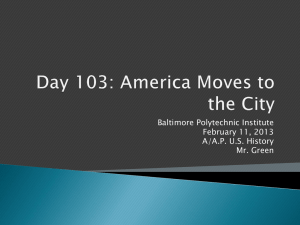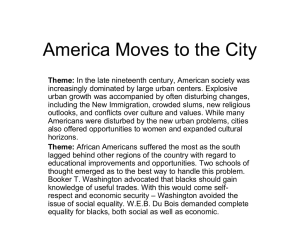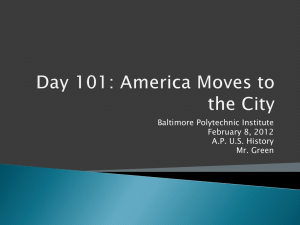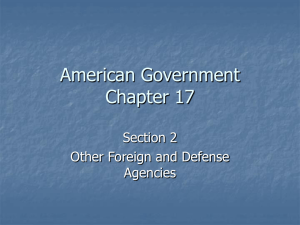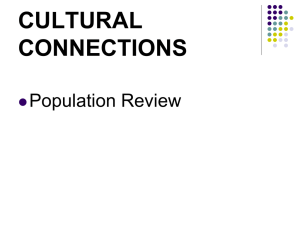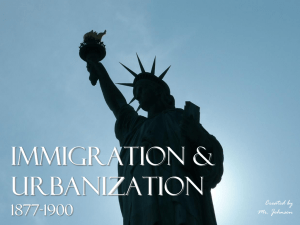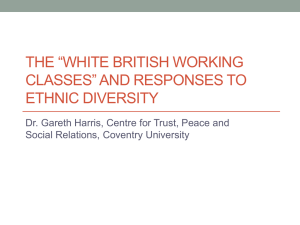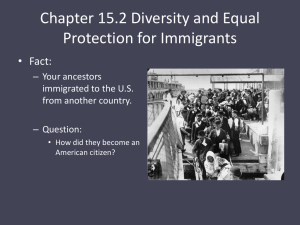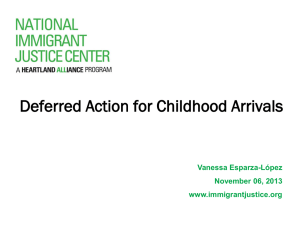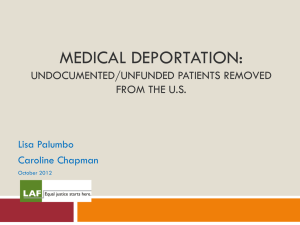PowerPoint - Interfaith Immigration Coalition
advertisement
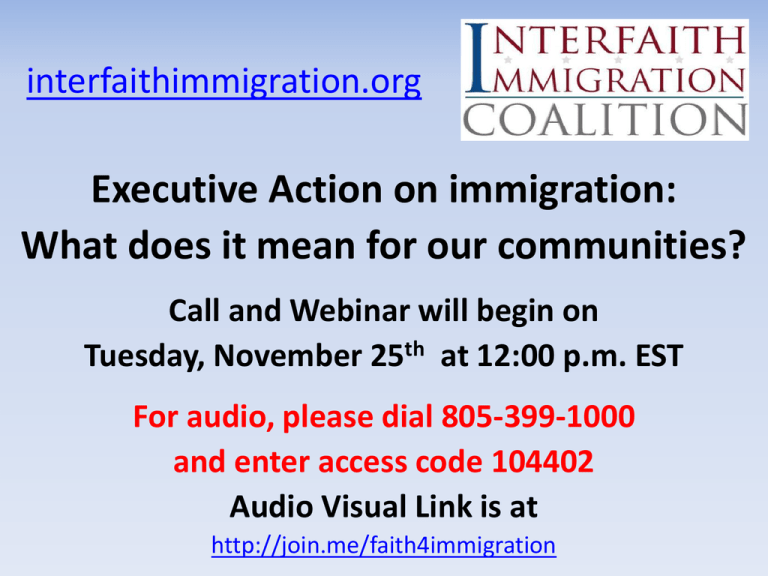
interfaithimmigration.org Executive Action on immigration: What does it mean for our communities? Call and Webinar will begin on Tuesday, November 25th at 12:00 p.m. EST For audio, please dial 805-399-1000 and enter access code 104402 Audio Visual Link is at http://join.me/faith4immigration AGENDA 12:00 Welcome & Overview 12: 05 David Leopold, General Counsel and Former President of the American Immigration Lawyers Association (AILA) 12: 15 Shiu-Ming Cheer, Immigration Attorney, National Immigration Law Center 12:25 Shaina Aber, Policy Director, Jesuit Conference and Brittney Nystrom, Director for Advocacy, Lutheran Immigration and Refugee Service 12:35 Noel Andersen, National Grassroots Coordinator, Church World Service 12:45 Q&A President’s Authority to Act • Deferred action is one of the many long-standing forms of prosecutorial discretion available to the Executive Branch. • Every U.S. President has used their authority to offer temporary immigration relief to groups in need since at least 1956. George W. Bush exercised prosecutorial discretion in the aftermath of Hurricane Katrina for over 40 percent of the then-unauthorized population. • President Obama has signed fewer executive orders than any president in 130 years. • The President has been clear that he can’t stop all deportations or fix the immigration system on his own, but he has also been clear that he has some power to address immigration within existing legal authorities – just as numerous Presidents before him have done. 3 Deferred Action for Parents (DAP) • Undocumented parents of U.S. citizens or lawful permanent residents (LPRs) can apply for deferred action for a 3 year period that can be renewed if they: – have continuously been in the U.S. since before Jan 1, 2010 – AND have a USC or LPR child on the date of announcement • Receive a social security number & can work and travel legally • No path to permanent residence or citizenship • Must pass a background check & pay $465 fees • Completely discretionary and may be revoked any time • DHS must identify persons in their custody who meet DAP criteria, review pending removal cases, and refer such individuals to USCIS. 4 Expansion of Deferred Action for Childhood Arrivals (DACA) • Currently DACA allows individuals under 31 who came to the U.S. before June 15, 2007 and before they turned 16 to apply for deferred action • The administration is expanding eligibility for DACA by: – removing the 31 year age cap – permitting children under 15 years of age to apply – moving the date of entry to Jan 1, 2010 • 3-year period that can be renewed • Receive social security number & work and travel authorization • Must pass background check and pay $465 in fees • No path to permanent residence or citizenship • Completely discretionary and may be revoked any time 5 Improvements to 3 and 10 Year Bar Waivers • Many undocumented immigrants who otherwise qualify for permanent residence must leave the country first before they can get a green card. However, when they leave the U.S. they trigger a 3- or 10-year bar to re-entry. • Last year, USCIS announced that the spouses and minor children of U.S. citizens can apply for a waiver while still in the U.S. if they demonstrate that separation would cause “extreme hardship” to a U.S. citizen spouse or parent. • The administration will now permit spouses and children of LPRs and adult children of U.S. citizens to seek waivers. • Criteria for “extreme hardship” under revision 6 How can we prepare? • Educate communities and guard against notario fraud – no one can apply for anything yet • Help people gather documents that establish their identity, how long they have lived in the U.S., and relationship to a US citizen or greencard holder • Direct individuals to credible legal resources and emphasize people working with a lawyer to apply – – – – – – – – – www.uscis.gov AdminRelief.org iAmerica.org CLINIC: Catholic Legal Immigration Network Justice for Our Neighbors immigration legal clinics CWS refugee resettlement network Lutheran Immigration and Refugee Service National Immigration Law Center American Immigration Lawyers Association 7 Enforcement Priorities & Prosecutorial Discretion DHS issued a memo on Nov. 20, 2014, that will take the place of the June 2011 PD memo. The Nov. 20 memo creates new “priority” levels: • Priority 1: – – – – Suspected terrorists National security threats People apprehended at the border/ports of entry while attempting to enter Certain people with felony convictions (not state/local offenses predicated on immigration status) – Certain gang crimes – Aggravated felonies 8 Enforcement Priorities & Prosecutorial Discretion • Priority 2: – Persons convicted of 3 or more misdemeanors (not traffic offenses or state/local offenses predicated on immigration status) or significant misdemeanors – Those who entered or re-entered the country unlawfully after Jan 1, 2014 – Those who “significantly abused visa or waiver programs” • Priority 3: – Issued a final removal order on or after Jan 1, 2014 9 Enforcement Priorities & Prosecutorial Discretion • People in all three categories will be prioritized for deportation unless they qualify for a way to remain in the U.S. legally or can show that they are not a threat to public safety or national security. • DHS should balance positive and negative equities, including: – eligibility for relief from removal – extenuating circumstances involving the offense – extended length of time since the offense – length of time in the U.S. – military service – U.S. family or community ties – status as a victim, witness, plaintiff in civil or criminal case – compelling humanitarian factors such as poor health, age, pregnancy, a young child, or a seriously ill relative 10 Replacement of S-Comm • The Secure Communities (S-Comm) program mandated that local police collaborate with Immigration and Customs Enforcement (ICE), reducing community trust in police • S-Comm will end and be replaced with the Priority Enforcement Program (PEP) • Under PEP, ICE will continue to receive fingerprint information from all persons at the time of booking. However, ICE is directed to take enforcement action only against persons who have been convicted of a criminal offense that makes them a priority for removal. • In most cases, ICE will request notification of someone’s release, rather than detention. It is still unclear, however, how this will be implemented. 11 Integration & Citizenship • White House Task Force on New Americans, additional outreach to promote English learning and citizenship • Fee study to determine whether it can offer a partial fee waiver for applicants with an incomes slightly above the current cutoff for fee waivers. • Credit cards can now be used for naturalization fees 12 More Border Enforcement Isn’t the Answer • The administration is planning to re-direct funds for border enforcement, but the Border Patrol has massive problems with corruption, excessive use of force and lack of accountability. Militarizing our borders and criminalizing our community members shouldn’t be trade-offs for relief for families. 13 God’s Love Knows No Borders 14 “Felons not Families” • As people of faith, we know that each person matters and is sacred. The administration should take into account the totality of circumstance and lead with forgiveness from past infractions, especially if they are immigration related. • Push back against “Felons not Families” by leading with a faith message that includes redemption, grace and forgiveness 15 Family Separation will Continue to be a part of our Immigration System 16 More work needed • While the President has a released a broad outline of his immigration executive actions, the details, including the application process, have not been finalized. In other words, there is nothing to apply for yet and potential applicants should be careful not to fall victim to immigration scams. • Individuals who will likely not qualify – People living in the U.S. for less than 5 years – People without U.S. citizen, LPR children, e.g., DREAMer parents – People with certain infractions – illegal re-entry, past crimes – need for redemption • Emphasis on border enforcement – Border resources seen as having “effectively reduced the number of unaccompanied children crossing the border illegally this summer.” • Access to protection for asylum seekers, including children and families fleeing violence in Central America • Family detention 17 Immigration Court Reforms • The Department of Justice will issue immigration court reforms to address the current backlog of pending cases by working with DHS to more quickly adjudicate cases of individuals who meet new DHS-wide enforcement priorities and close cases of individuals who are low priorities. • The Department of Justice will also pursue regulations that adopt best practices for court systems to use limited court hearing time more efficiently. 18 Defending Administrative Action • Educate our communities • Urge Congress to support this action: 1-866-940-2439 • Appropriations • Defeat federal anti-immigrant legislation – Bills to stop deferred action – Rejecting additional border militarization and detention beds – Protecting unaccompanied children • Defend against negative state bills that would deny drivers licenses, IDs to DAP, DACA recipients 19 Local and State Initiatives • The next congress is not expected to move immigration legislation that the President could actually sign. • Immigration policy will move to the local and state levels in protecting administrative action and the ability to get a license with deferred action • Push forward with state driver’s license, equitable tuition, municipal IDs, local detainer policies, Sanctuary City Ordinances and more • Focusing on civic engagement to build power for 2016 elections, future Congressional immigration reform 20 Sanctuary Movement Cases 21 ROSA’S NOT PART OF RELIEF • Rosa has been part of the Tucson community since 1999 where she and her husband have raised their two boys. Mrs. Robles is an active member of the community- she volunteers at her church, her sons’ school, and their baseball teams. On Rosa’s 100th day in sanctuary, the Tucson community and more than 120 faith leaders came together to mark the days she has spent taking refuge in the church. • Rosa’s order of deportation stemmed from a minor traffic violation. Despite the fact that Rosa’s case is considered low-priority for ICEshe has no criminal record, is a caretaker of minors, and has longstanding ties in the community- ICE has refused to end her order of deportation. • Tucson City Council and the Pima Board of Supervisors sent memos to the White House and Homeland Security along with 7,000 letters of support from the community asking that Rosa’s order of removal be rescinded. Faith leaders from across the country, community members, and Tucson city officials have made it clear that Rosa is a valued member of their community and that the order for her deportation is unacceptable. 22 LUIS SHOULD MAKE IT • On July 7, 2014, his attorney submitted a request for a stay of removal to keep Luis in the United States with his wife and children, but that request has been denied. Luis now lives under the threat of immediate deportation and has sought sanctuary at University Presbyterian Church in Phoenix, AZ. • Luis fled from his home in Guatemala the night that a gang cornered him and gave him an ultimatum: join, leave, or die. His family put him on a bus headed towards Mexico just hours later. At the young age of 16, Louis was forced to fend for himself, unable to return to his family. He worked in different towns in Mexico, saving up money, and finally came to the United States in 2007 where he found a job as a night janitor at a local school where he met his wife. • When driving home from work one day, Luis was pulled over by local police. Under the guise of Arizona’s SB1070, this traffic stop soon turned into the onset of deportation proceedings for Luis. Despite the fact that Luis could show “credible fear” of returning to Guatemala, his petition for asylum was denied and he was given 45 days to leave the country. 23 Implementation • Advocate for inclusive implementation process • Community Education • Help people gather appropriate documents they will need to apply • Stop Fraud- Guard against “Notarios” • Legal Clinics and increase access to legal services • Fundraise for application costs 24 Holy Days and Holidays Worship resources for various faith holidays throughout the year that highlight stories and lift up prayers regarding immigration issues faced by our neighbors: • Thanksgiving – “Who’s Behind the Plate,” stories and prayers of farmworkers in the United States and the justice issues they face. • Advent – “Remembering Families Awaiting Unity and Action,” stories and prayers of those awaiting Administrative action, due process protection, release from detention, family unity, and those awaiting deportation relief in sanctuary. www.interfaithimmigration.org/2014/03/04/religious-holiday-resources/ IIC Contacts by organization • African American Ministers in Action: Leslie Malachi, lmalachi@pfaw.org • American Baptist Home Mission Societies of the American Baptist Churches, USA: Aundreia Alexander, Aundreia.Alexander@abhms.org • American Friends Service Committee: Lia Lindsey, llindsey@afsc.org • American Jewish Committee: Chelsea Hanson, hansonc@ajc.org • Bread for the World Institute: Andrew Wainer, awainer@bread.org • Christian Church (Disciples of Christ): Sharon Stanley, sstanley@dhm.disciples.org • Church of the Brethren: Nate Hosler, nhosler@brethren.org • Church World Service: Jen Smyers, jsmyers@cwsglobal.org • Columban Center for Advocacy and Outreach: Chloe Schwabe, cschwabe@columban.org • Conference of Major Superiors of Men: Eli McCarthy emccarthy@cmsm.org • Daughters of Charity: Mary Ellen Lacey, Maryellen.lacy@doc.org • Episcopal Church: Katie Conway, kconway@episcopalchurch.org • Franciscan Action Network: Marie Lucey, lucey@franciscanaction.org • Friends Committee on National Legislation: Ruth Flower, flower@fcnl.org • HIAS: Liza Lieberman, • liza.lieberman@hias.org • Interfaith Worker Justice: Michael • Livingston, mlivingston@iwj.org • Irish Apostolate USA: Geri Garvey, • administrator@usairish.org • Islamic Information Center: (currently no • contact available) • Jesuit Refugee Service/USA, Mary Small, • msmall@jesuit.org • • Jewish Council for Public Affairs: Jill Borak, jborak@thejcpa.org • • Leadership Conference of Women Religious: Ann Scholz, SSND ascholz@lcwr.org • • Lutheran Immigration and Refugee Service: Brittney Nystrom, Bnystrom@lirs.org • • Maryknoll Office for Global Concerns: Judy Coode, jcoode@maryknoll.org • • Mennonite Central Committee: Tammy Alexander, TammyAlexander@mcc.org • • Muslim Public Affairs Council: Hoda Elshishtawy, hoda@mpac.org • • Sisters of the Good Shepherd: Larry Couch, lclobbyist@gsadvocacy.org • • National Council of Churches: Russell Meyer, rmeyer@floridachurches.org • • National Council of Jewish Women: Madeline Shepherd, madeline@ncjwdc.org • • NETWORK: Ashley Wilson, awilson@networklobby.org Pax Christi: Anne-Louise Nadeau, anadeau@paxchristiusa.org PICO: Gordon Whitman, gwhitman@piconetwork.org Presbyterian Church, USA: Teresa Waggener, Teresa.Waggener@pcusa.org Sisters of Mercy of the Americas: Ryan Murphy, rmurphy@sistersofmercy.org Sojourners: Ivone Guillen, iguillen@sojo.net 3P Human Security: Tom Brenneman, cooperativebydesign@gmail.com T’ruah: The Rabbinic Call for Human Rights, Rabbi Rachel Kahn-Troster rkahntroster@truah.org Union for Reform Judaism: Charlie Arnowitz, carnowitz@rac.org Unitarian Universalist Association: Jen Toth, JToth@uua.org United Church of Christ: Rev. Mari Castellanos, castellm@ucc.org United Methodist Church: Bill Mefford, bmefford@umc-gbcs.org UNITED SIKHS: Anisha Singh, anisha.singh@unitedsikhs.org U.S. Conference of Catholic Bishops: Kevin Appleby, kappleby@usccb.org U.S. Jesuit Conference, Shaina Aber, saber@jesuit.org World Relief: Jenny Hwang, jhwang@worldrelief.org

